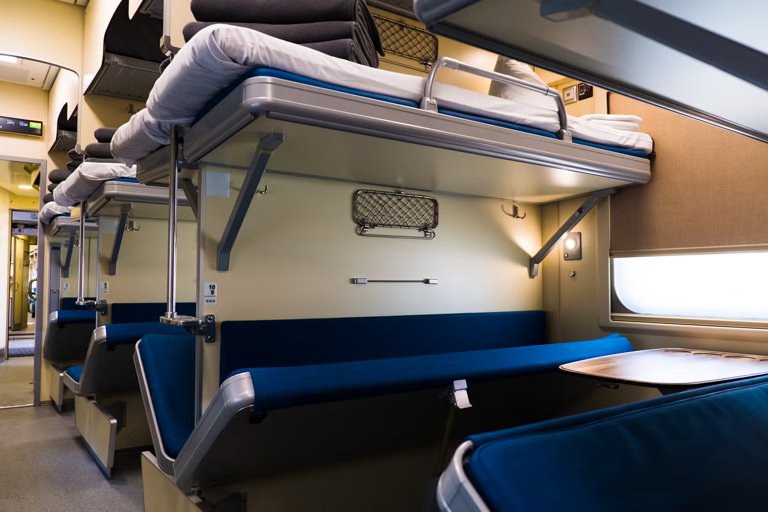Travel & Lifestyle
Rail Travel Revival: How Sleeper Trains Are Gaining Popularity Among UK Tourists
With sustainability concerns growing, overnight rail services are once again drawing travellers looking for eco-friendly alternatives to short-haul flights across Britain and Europe.
2025-08-19 15:14
By Daniel Fletcher

Sleeper trains, once considered a fading relic of Britain’s rail network, are enjoying a revival as more travellers look for sustainable and convenient alternatives to short-haul flights. Services connecting London with Scotland and Cornwall have seen a surge in interest, with ticket sales rising steadily throughout 2024 and into this year. Rail operators say the appeal lies in combining transport with accommodation, saving both time and money for passengers.
The renewed enthusiasm for overnight travel coincides with heightened public awareness about climate change. Environmental campaigners have highlighted the significant reduction in carbon emissions when passengers choose rail over air. Data released by the Department for Transport shows that sleeper trains emit a fraction of the CO₂ produced by short-haul flights, making them an attractive option for eco-conscious travellers.
Passenger testimonials suggest the appeal extends beyond environmental benefits. Many travellers describe the experience as an adventure in itself, with private cabins, lounge cars, and scenic routes that unfold through the night. The romance of train travel, combined with modern amenities such as Wi-Fi and improved bedding, has given overnight services a blend of nostalgia and comfort that resonates with both older and younger passengers.
Tourism boards in Scotland and Cornwall report increased visitor numbers linked to sleeper services. By allowing tourists to arrive refreshed in the morning, rail operators are helping destinations capture longer stays and greater spending. Hotels near train terminals in cities such as Inverness and Penzance have noted a rise in early check-ins, indicating how rail schedules are shaping travel behaviour.
Operators like Caledonian Sleeper and Great Western Railway have invested heavily in upgrading rolling stock. Newer trains feature en-suite cabins, soundproofing, and improved safety systems. These investments are designed to compete directly with budget airlines, positioning overnight services not only as an alternative but as a premium experience that justifies higher fares.
Critics, however, argue that sleeper trains remain expensive for many travellers, with single-occupancy cabins sometimes costing more than budget flights plus a night in a modest hotel. Consumer groups warn that unless rail operators can lower entry-level prices, the market may remain niche. Nonetheless, the steady growth in demand suggests that a significant portion of travellers are willing to pay more for the convenience and sustainability factors.
Beyond tourism, sleeper trains are increasingly being used for business travel. Professionals appreciate the ability to travel overnight and arrive ready for meetings without losing a day to transit. Rail companies have responded by tailoring some services to business passengers, offering quiet zones, faster Wi-Fi, and catering options designed for work on the move.
Government support has also played a role in the revival. Subsidies and grants aimed at reducing carbon emissions have helped keep ticket prices competitive. Transport officials have expressed interest in expanding the network, potentially restoring routes that were cut decades ago under cost-saving measures. Such expansions could see overnight connections extended to more regional cities.
The cultural cachet of sleeper trains has been boosted by social media, where influencers and travel bloggers share videos of their journeys. These posts often highlight the unique experience of waking up to new landscapes outside the window, adding a sense of novelty that resonates with digital audiences. Rail companies have seized on this trend by partnering with content creators to promote their services.
In Cornwall, the overnight route to Penzance has given coastal communities new opportunities to attract off-season tourists. Local businesses say passengers arriving early in the day often spend more time in town centres before heading to beaches or countryside areas. This redistribution of visitor spending is helping smaller towns benefit from tourism beyond the summer months.
Analysts suggest the current revival could be just the beginning of a larger transformation in Britain’s transport culture. As climate policies tighten and consumers seek alternatives to air travel, rail networks may become central to domestic and regional tourism strategies. The sleeper train’s blend of sustainability and experience-driven appeal makes it a natural fit for these trends.
For now, passengers continue to book seats and cabins at record levels, with some peak services selling out weeks in advance. As demand grows, operators face the challenge of balancing affordability with the premium aspects that make overnight rail distinctive. If they succeed, the railways may well re-establish themselves as not just a means of travel, but a defining part of the UK holiday experience.